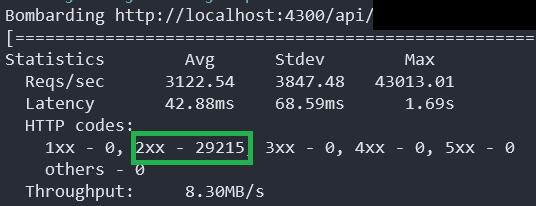Production environment is on Azure, using Redis Cache Standard 2.5GB.
Example 1
System.Web.HttpUnhandledException (0x80004005): Exception of type 'System.Web.HttpUnhandledException' was thrown. ---> StackExchange.Redis.RedisTimeoutException: Timeout performing SETNX User.313123, inst: 49, mgr: Inactive, err: never, queue: 0, qu: 0, qs: 0, qc: 0, wr: 0, wq: 0, in: 0, ar: 0, clientName: PRD-VM-WEB-2, serverEndpoint: Unspecified/Construct3.redis.cache.windows.net:6380, keyHashSlot: 15649, IOCP: (Busy=0,Free=1000,Min=1,Max=1000), WORKER: (Busy=1,Free=32766,Min=1,Max=32767) (Please take a look at this article for some common client-side issues that can cause timeouts: http://stackexchange.github.io/StackExchange.Redis/Timeouts) at StackExchange.Redis.ConnectionMultiplexer.ExecuteSyncImpl[T](Message message, ResultProcessor
1 processor, ServerEndPoint server) in c:\code\StackExchange.Redis\StackExchange.Redis\StackExchange\Redis\ConnectionMultiplexer.cs:line 2120 at StackExchange.Redis.RedisBase.ExecuteSync[T](Message message, ResultProcessor1 processor, ServerEndPoint server) in c:\code\StackExchange.Redis\StackExchange.Redis\StackExchange\Redis\RedisBase.cs:line 81
Example 2
StackExchange.Redis.RedisTimeoutException: Timeout performing GET ForumTopic.33831, inst: 1, mgr: Inactive, err: never, queue: 2, qu: 0, qs: 2, qc: 0, wr: 0, wq: 0, in: 0, ar: 0, clientName: PRD-VM-WEB-2, serverEndpoint: Unspecified/Construct3.redis.cache.windows.net:6380, keyHashSlot: 5851, IOCP: (Busy=0,Free=1000,Min=1,Max=1000), WORKER: (Busy=1,Free=32766,Min=1,Max=32767) (Please take a look at this article for some common client-side issues that can cause timeouts: http://stackexchange.github.io/StackExchange.Redis/Timeouts) at StackExchange.Redis.ConnectionMultiplexer.ExecuteSyncImpl[T](Message message, ResultProcessor
1 processor, ServerEndPoint server) in c:\code\StackExchange.Redis\StackExchange.Redis\StackExchange\Redis\ConnectionMultiplexer.cs:line 2120 at StackExchange.Redis.RedisBase.ExecuteSync[T](Message message, ResultProcessor1 processor, ServerEndPoint server) in c:\code\StackExchange.Redis\StackExchange.Redis\StackExchange\Redis\RedisBase.cs:line 81 at StackExchange.Redis.RedisDatabase.StringGet(RedisKey key, CommandFlags flags) in c:\code\StackExchange.Redis\StackExchange.Redis\StackExchange\Redis\RedisDatabase.cs:line 1647 at C3.Code.Controls.Application.Caching.Distributed.DistributedCacheController.Get[T](String cacheKey) in C:\Construct.net\Source\C3Alpha2\Code\Controls\Application\Caching\Distributed\DistributedCacheController.cs:line 115 at C3.Code.Controls.Application.Caching.Manager.Manager.Get[T](String key, Func`1 getFromExternFunction, Boolean skipLocalCaches) in C:\Construct.net\Source\C3Alpha2\Code\Controls\Application\Caching\Manager\Manager.cs:line 159 at C3.PageControls.Forums.TopicRender.Page_Load(Object sender, EventArgs e) in C:\Construct.net\Source\C3Alpha2\PageControls\Forums\TopicRender.ascx.cs:line 40 at System.Web.UI.Control.OnLoad(EventArgs e) at System.Web.UI.Control.LoadRecursive() at System.Web.UI.Control.LoadRecursive() at System.Web.UI.Control.LoadRecursive() at System.Web.UI.Control.LoadRecursive() at System.Web.UI.Control.LoadRecursive() at System.Web.UI.Control.LoadRecursive() at System.Web.UI.Control.LoadRecursive() at System.Web.UI.Page.ProcessRequestMain(Boolean includeStagesBeforeAsyncPoint, Boolean includeStagesAfterAsyncPoint)
These errors are sporadic, several times a day.
Is this an Azure network blip, or something I can reduce? Looking at the numbers in the error doesn't seem anything out of the ordinary, and the server load never seems to go above 7% as reported by Azure.
Redis connection
internal static class RedisController
{
private static readonly object GetConnectionLock = new object();
public static ConnectionMultiplexer GetConnection()
{
if (Global.RedisConnection == null)
{
lock (GetConnectionLock)
{
if (Global.RedisConnection == null)
{
Global.RedisConnection = ConnectionMultiplexer.Connect(
Settings.Deployment.RedisConnectionString);
}
}
}
return Global.RedisConnection;
}


xxxxxxx.redis.cache.windows.net:6380,password=xxxxxx=,ssl=True,abortConnect=False,allowAdmin=TrueWe have two VM's in Azure running the webapp that use Redis. We're using StackExchange.Redis 2.0.513 Any help much appreciated, we're at our wits end here. We've changed inApplication_Start ThreadPool.SetMinThreads(10, 10)from default but seems to of not made any difference. – Gussi